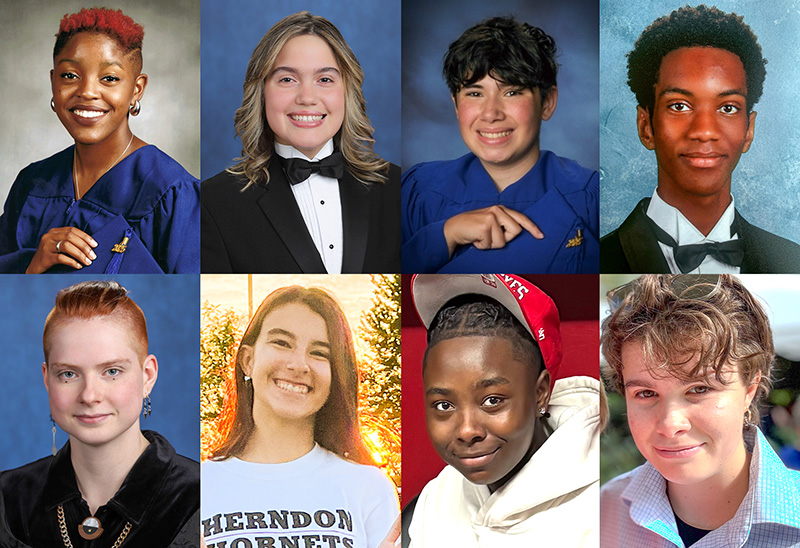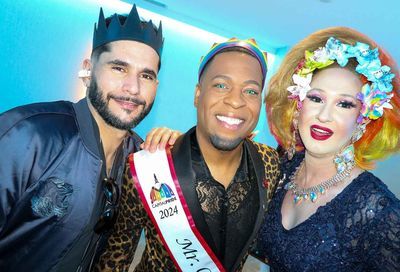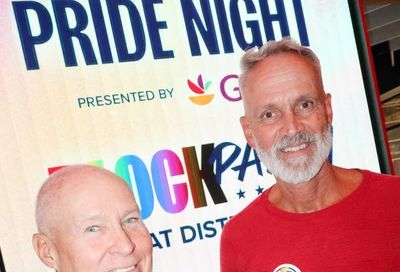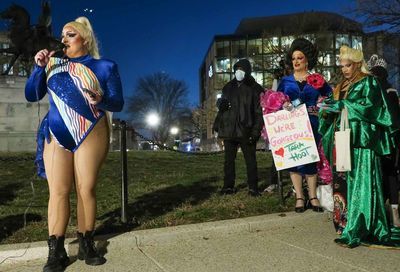‘Thirty’ Gives Black Gay Characters ‘Airtime’ (Review)
The feature-length adaptation of sexy gay Black soap opera "Thirty" goes long on drama, but comes up short in the execution.

Queer cinema needs more films like Thirty.
Maybe not exactly like Thirty, a feature loosely assembled from episodes of the eponymous VOD series created by Dontá Morrison and co-written with director Anthony Bawn. But films that likewise feature a gay Black couple as the center of the story, or of a circle of friends, come few and far between.
Undeniably the stories are out there, as is the audience, yet, as one Thirty character laments of the media landscape, “white boys get all the airtime.”
Thirty lends its air time to the epic trials and tribulations of longtime couple Khalil (Bobby Musique Cooks), a Hollywood stylist, and Tyrin (Brandon Moten), an ad agency owner, and their young and restless friends, most of whom are Black and queer.
Compiling the show’s first season into a coherent, if not seamless, melodrama of escalating crises and revelations, Thirty gels as a film unto itself. Not a good film, but, nevertheless, the movie earns half a star at least for Tyrin and Khalil’s enthusiastic love scenes.
Cooks and Moten have credible chemistry as a couple, especially in those erotically charged moments, which aren’t frequent but are potent. The alluring glimpses of full-frontal don’t hurt — and a round of make-up sex on the kitchen floor provides a welcome respite from long-winded scenes of clumsily-delivered dialogue, choppily edited into contrived, overacted confrontations.
The film gets off to a dubious start, opening on what sounds like a knock-down, drag-out domestic brawl inside a Malibu beach house. The camera remains perched outside, so we only hear the melee, and Tyrin shouting for Khalil to “Stop!” as a title card sets the scene in July, 1999.
Yet, just moments later, in the first of many bombshell revelations, Tyrin learns from mysterious stranger Darion (Dustin Baker) that ten years ago, in 1992, Tyrin’s ex-girlfriend gave birth to their son.
The math doesn’t add up, and neither do many of Bawn’s editing choices, which do a disservice to his work as cinematographer. Why, for instance, do we see a montage of Khalil working out right before a scene in which Khalil berates Tyrin for spending the whole morning working out instead of hanging out with him?
But wasn’t Khalil also just working out? Why is no one bringing that up when the whole premise of this argument is that he was home alone waiting for his man while Tyrin was out running up a canyon? Why do we see Khalil working out at all?
There’s plenty of time to ponder that, what year it really is, and other conundrums, while Tyrin and Khalil engage in petty squabbles like whether or not Khalil should have had breakfast ready for Tyrin after this incredibly contentious workout.
Ultimately, the story, based on Morrison’s 2012 novel The End of the Rainbow, dives into deeper waters as petty complaints are surpassed by life-changing revelations, including a disappointingly HIV-shaming storyline (that perhaps explains the ’90s-’00s period setting).
The severity of Tyrin’s past transgressions progresses sharply as events unfold, triggering ridiculous overreactions. The leads’ portrayals, which don’t put much convincing intent behind the couple’s loud emotions, never rise above the material. Although, co-lead Cooks, a.k.a. R&B artist B. Musiq, does contribute a fine closing credits track, “You and I.”
Otherwise, the really decent performances emerge from the supporting cast. Tyrin’s crew of catty queens, generally good for comic relief, offers us Brandon Karson as straight-talking homie Spencer, and Aigner Edgerson as boozy straight girl bestie Lea, two genuine-seeming characters you might want to pull up with to a party, or to a screening of this movie.
Watching it with their commentary might be more entertaining than the film.
Thirty (★☆☆☆☆) is available to stream through VOD services, including Amazon, iTunes, Google Play, Vudu, and Vimeo. Visit www.bgpics.com.
Support Metro Weekly’s Journalism
These are challenging times for news organizations. And yet it’s crucial we stay active and provide vital resources and information to both our local readers and the world. So won’t you please take a moment and consider supporting Metro Weekly with a membership? For as little as $5 a month, you can help ensure Metro Weekly magazine and MetroWeekly.com remain free, viable resources as we provide the best, most diverse, culturally-resonant LGBTQ coverage in both the D.C. region and around the world. Memberships come with exclusive perks and discounts, your own personal digital delivery of each week’s magazine (and an archive), access to our Member's Lounge when it launches this fall, and exclusive members-only items like Metro Weekly Membership Mugs and Tote Bags! Check out all our membership levels here and please join us today!























You must be logged in to post a comment.